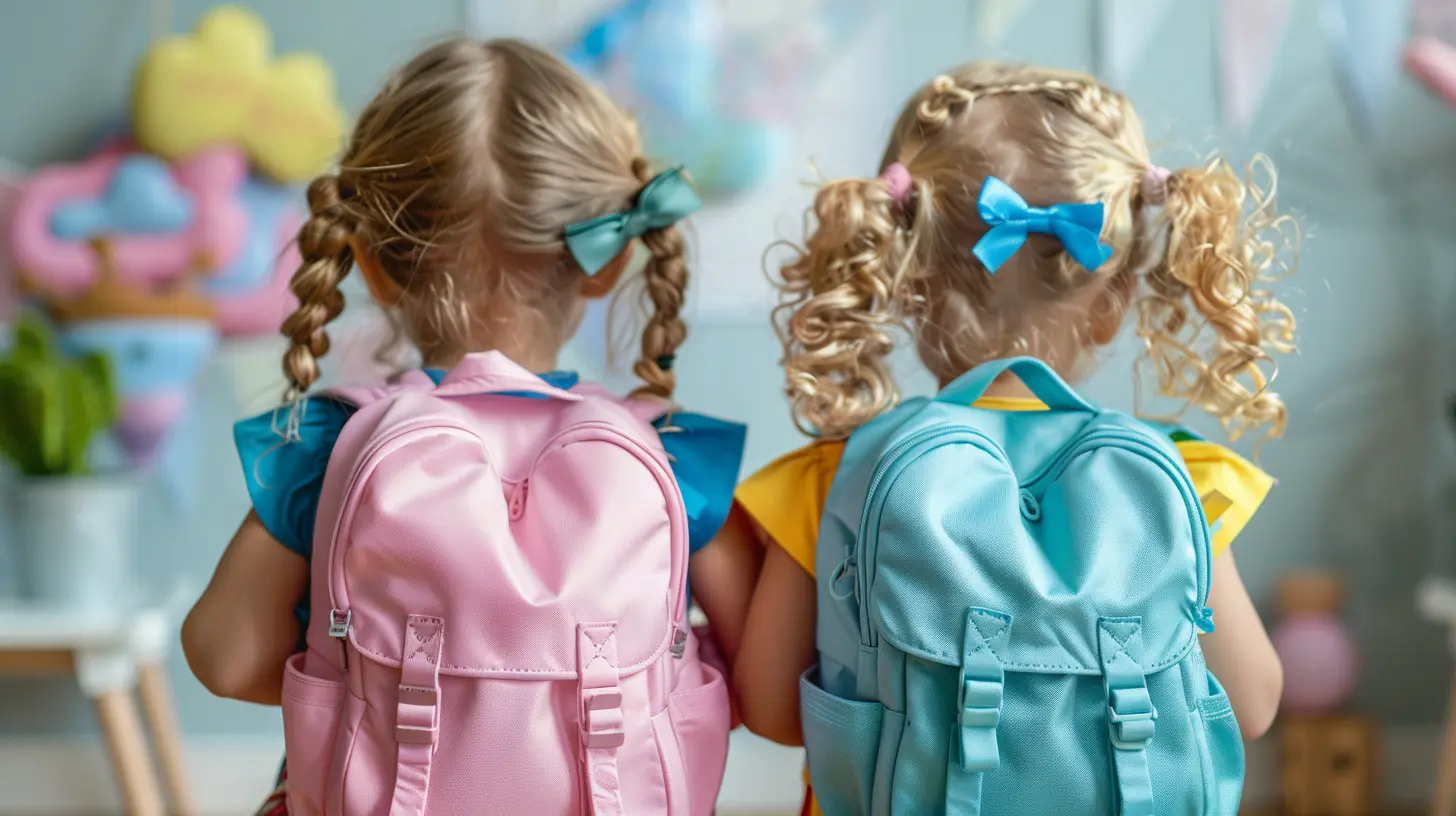Helping Twins Transition to School: What Parents Need to Know
10 December 2024
Starting school is a milestone for any child, but when you’ve got twins, the experience can feel like you're juggling two plates while walking a tightrope. Double the backpacks, double the lunch prep, and double the emotions! While twins may have a built-in buddy to lean on, transitioning to school comes with its unique challenges and opportunities for them—and their parents. Let’s dig into what you, as a parent of twins, need to know to help make this transition as smooth as possible.
1. Understanding the Unique Dynamics of Twins
First off, let’s recognize the fact that twins aren’t like regular siblings—they have a bond that’s downright magical. Whether they’re identical or fraternal, twins often share an unspoken connection. But here’s the thing: that connection can shape their school experience in surprising ways.Some twins rely heavily on each other, which can be a double-edged sword. While it’s adorable that they’re each other's comfort zone, it could also hold them back from developing independence. On the flip side, others might compete for attention, which might cause friction or even impact their confidence.
So what’s the big takeaway for parents? Each twin is unique, and your job is to nurture their individuality while respecting their bond. Easier said than done, right? Don’t worry, we’ve got some tips coming up.
2. The Big Decision: Separate Classrooms or Together?
Ah, the age-old question that leaves twin parents in a pickle—should you put them in the same classroom or separate them? Spoiler alert: There’s no one-size-fits-all answer here. It really depends on your twins’ personalities, relationship, and how they thrive.When to Keep Them Together
If your twins are like peanut butter and jelly—inseparable and complementary—it might make sense to keep them in the same classroom. Being together during the first year of school can help them adjust to the new environment without feeling overwhelmed. Plus, they practically come with a built-in buddy system!When to Separate Them
On the other hand, if one twin is more dominant or they tend to squabble like cats and dogs, separation might be the better route. Giving them their own classrooms can encourage independence, help them make new friends, and reduce any comparisons or competition.Pro-tip: Discuss your decision with their teachers or school administrators. They’ve dealt with twins before and can offer valuable insights.
3. Preparing Your Twins for the Transition
Let’s be honest—starting school can be nerve-wracking for any kid. Now add in the complexity of managing twin dynamics, and you've got yourself a project. Here are some practical steps you can take to prepare your little ones for their big adventure:Talk About What to Expect
Kids often fear the unknown, so paint them a picture of what school life will look like. Walk them through what the classroom might look like, how lunchtime works, and what kinds of activities they’ll get to do. And do this for both twins individually—don’t let one twin dominate the conversation.Role-Playing Can Be a Lifesaver
Turn your living room into a mini-classroom and act out common school scenarios. Who’s the teacher? Who’s the student? (Bonus points if you let them take turns!) This is a great way to help them practice routines like raising their hands, sharing, or asking for help.Visit the School Together
Many schools offer orientation days—take full advantage of those. Let your twins see their classrooms, meet their teachers, and familiarize themselves with the hallways. Feeling comfortable in their surroundings can do wonders for easing first-day jitters.Encourage Independence
Does one twin always tie the other’s shoes or speak for the quieter sibling? If so, start teaching them to do things on their own. Independence is like a muscle—it gets stronger the more you work at it. Things like packing their own backpacks or choosing their outfits are small but meaningful steps.
4. Helping Twins Navigate the Social Scene
If you’re worried about how your twins will fit in socially, you’re not alone—it’s one of the top concerns for twin parents. The key here is to strike a balance between their twin bond and their relationships with other kids.Avoid Labeling Them as a Unit
Teachers and classmates might be tempted to refer to your kids as “the twins,” but it’s your job to set the tone. Make sure your kids are addressed individually by name—it helps reinforce their identity.Encourage Individual Friendships
If your twins are in the same classroom, actively encourage them to branch out and make friends separately. This might mean inviting different friends over for playdates or signing them up for different extracurricular activities.Teach Social Skills
Let’s face it—sharing and taking turns can be tricky even for adults! Take time to talk to your kids about kindness, listening, and problem-solving. Twins might have a head start in the collaboration department since they’re used to sharing space, but it never hurts to reinforce those skills.5. Dealing with Comparisons and Competition
Here’s the truth: Comparisons are inevitable when you’ve got twins. Whether it’s who reads faster, who’s better at math, or who makes friends more easily, those comparisons can creep in from teachers, classmates, and yes—sometimes even from us parents.Celebrate Individuality
Get in the habit of praising each twin for their individual strengths. For instance, if one twin excels at art and the other at sports, make a point to highlight both talents equally. Avoid phrases like "Why can't you be more like your sibling?" Trust me, that’ll only create resentment.Set Individual Goals
One way to minimize competition is to set goals tailored to each twin’s abilities and interests. For example, if one twin is struggling with reading, their goal might be to complete a simple book, while the other twin’s goal might be to tackle a more advanced one. It’s all about fostering their personal growth without comparing them.6. The Emotional Side: Be Ready for Mixed Feelings
Let’s not sugarcoat it—sending twins to school can stir up a cocktail of emotions. You might feel proud, anxious, or even a little sad as you watch your babies grow up. And odds are, they’re feeling just as much (if not more) than you are.Talk openly about feelings, especially if one twin seems more nervous than the other. Reassure them that it’s perfectly okay to feel scared, excited, or even confused. And remember, while twins often share emotions, they might not process them in the same way.
Lastly, give yourself some grace. Parenting twins is no joke, and there’s no “perfect” way to do this. You’re doing your best, and that’s more than enough.
7. The First Day of School: What to Expect
The big day has arrived! Pack those lunchboxes, take those first-day photos (yes, cliché but essential), and prepare yourself for the emotional rollercoaster. Here’s a little heads-up on what to expect:- Drop-Off Drama: Some twins might cling to you like Velcro, while others will happily run into the classroom without looking back. Be prepared for all scenarios.
- Different Reactions: Don’t be surprised if one twin takes to school like a duck to water while the other struggles a bit more. Kids transition at their own pace.
- After-School Debrief: Set aside time to talk about their day. Ask open-ended questions like, “What was the best part of today?” or “What made you smile?” It’ll give you valuable insights and help them process their experiences.
Final Thoughts
Helping your twins transition to school is a journey—and like any journey, it’ll have its ups and downs. The key is to stay flexible, tune into their individual needs, and trust that you’re laying the foundation for their success. Remember, you’re not just guiding them into a new chapter; you’re helping them blossom into their unique selves.Let their school adventure be the start of something beautiful—for both of them and for you as a parent.
all images in this post were generated using AI tools
Category:
Parenting TwinsAuthor:

Liam Huffman
Discussion
rate this article
16 comments
Honor Daniels
Oh, because what every parent of twins really needs is a detailed manual on how to wrangle two mini chaos agents into a structured place like school! Forget the coffee—let’s just stock up on patience and earplugs. Good luck, parents—you’re going to need it! 🥳🎒
February 6, 2025 at 3:56 AM

Liam Huffman
Absolutely! Every tip helps, and a sense of humor is essential. Thanks for the encouragement! 🥳🎒
Seraphine Patel
Navigating school transitions for twins requires understanding their unique dynamics. Encourage individual identities while fostering teamwork. Establish routines, communicate openly, and celebrate their achievements to ease anxiety.
February 1, 2025 at 4:31 AM

Liam Huffman
Thank you for your insightful comment! Emphasizing individuality while nurturing their bond is key to a smooth transition for twins. Your tips on routine and open communication are valuable for parents navigating this journey.
Catherine McConnell
Every step is an adventure—twin school days await!
January 29, 2025 at 5:22 PM

Liam Huffman
Absolutely! Embracing the adventure of school together can make the transition smoother for twins.
Pandora McAndrews
This article offers invaluable insights for parents of twins entering school. The tips on managing their unique needs and fostering independence are essential for a smoother transition. A must-read for all!
January 26, 2025 at 3:50 AM

Liam Huffman
Thank you for your kind words! I’m glad you found the insights helpful for navigating this important transition.
Lanae Lambert
Great insights on supporting twins in their school transition! Balanced advice for parents navigating this unique experience is invaluable. Thank you!
January 23, 2025 at 5:52 AM

Liam Huffman
Thank you for your kind words! I'm glad you found the insights helpful for supporting twins during this important transition.
Starla Sanders
Navigating the school transition for twins is a delicate dance of individuality and unity. Embrace their shared experiences while nurturing their unique identities, fostering resilience and connection in this pivotal stage of their growth.
January 19, 2025 at 4:06 PM

Liam Huffman
Thank you for highlighting the balance between individuality and unity for twins during this important transition. It's crucial for parents to support both their shared experiences and unique identities.
Karina Sharpe
Consider individual needs; each twin may experience school transition differently and uniquely.
January 16, 2025 at 5:37 PM

Liam Huffman
Absolutely! Recognizing each twin's unique experiences and needs is crucial for a smooth school transition. Tailoring support for their individual personalities will make a significant difference.
Olive Peterson
Embrace the adventure of school with your twins! With love, patience, and teamwork, you'll navigate this transition together, creating beautiful memories and building their confidence.
January 11, 2025 at 5:22 PM

Liam Huffman
Thank you for your encouraging words! Embracing this journey with love and teamwork truly makes a difference in our twins' school transition.
Candice Myers
Great article! Transitioning to school can be challenging for twins, but with love and support, they’ll thrive. Your tips are invaluable for creating a smooth start! Keep up the wonderful work!
January 8, 2025 at 5:42 AM

Liam Huffman
Thank you so much for your kind words! I'm glad you found the tips helpful for supporting twins during this transition. Your encouragement means a lot!
Lola Stewart
Great insights! Supporting twins during this transition makes all the difference. Thank you!
January 2, 2025 at 3:38 AM

Liam Huffman
Thank you for your kind words! I'm glad you found the insights helpful. Supporting twins during this transition is indeed essential!
Cassandra McClintock
Transitioning twins to school can be both thrilling and challenging. Embrace the journey together, celebrate their unique bond, and remember that every little step counts. With patience and understanding, you'll help them navigate this exciting new chapter with confidence.
December 27, 2024 at 4:36 PM

Liam Huffman
Thank you for your insightful comment! Embracing the journey and celebrating their unique bond is key to a smooth transition for twins. Your encouragement reinforces the importance of patience and understanding during this exciting time.
Faryn McNair
This article is a fantastic resource for parents of twins! The tips are practical and relatable, making the transition to school a smoother experience for both the kids and us. Thank you for sharing these insights!
December 24, 2024 at 4:53 PM

Liam Huffman
Thank you so much for your kind words! I'm glad you found the tips helpful for navigating this important transition. Best of luck to you and your twins!
Zephyra Ward
Great article! Transitioning twins to school can be both exciting and challenging. I appreciate the practical tips for managing their unique needs and building their confidence. Clear communication and teamwork will definitely make this journey smoother for both parents and kids!
December 22, 2024 at 3:31 AM

Liam Huffman
Thank you for your thoughtful comment! I'm glad you found the tips helpful for navigating this exciting transition with twins.
Mercy McMeekin
Transitioning twins to school can be challenging but rewarding. Establish routines, encourage independence, and nurture their unique bond. Open communication with teachers and fostering friendships will help ease their adjustment and enhance their school experience.
December 14, 2024 at 4:18 AM

Liam Huffman
Thank you for your insightful comment! Establishing routines and encouraging independence are key strategies for helping twins thrive in school while maintaining their unique bond. Open communication with teachers can indeed make a big difference!
Haze Vasquez
Creating a structured routine can ease twins' school transition significantly. Great insights!
December 11, 2024 at 5:49 PM

Liam Huffman
Thank you! I'm glad you found the insights helpful for easing the transition for twins.
Victor Cummings
This article highlights essential strategies for easing twins into school, emphasizing communication and individualized support to foster their unique needs.
December 10, 2024 at 5:19 PM

Liam Huffman
Thank you! I'm glad you found the strategies helpful. Supporting twins during their transition is crucial for their success in school.
MORE POSTS

Cultivating Responsibility in Your Child from an Early Age

Dealing with Teenage Attitude in a Constructive Way

How to Stay Organized as a Busy Working Mom

Helping Kids Take Responsibility for Their Own Learning

Creating a Safe and Supportive Home Environment with Positive Parenting

Stay-At-Home Dads: The Joys and Struggles of Raising Toddlers

Building Confidence in Kids Through Creative Expression

Essential Gear for Parents of Twins: What You Really Need

Supporting Your Child in Becoming an Independent Learner

Celebrating Milestones Together: Ideas for Every Age